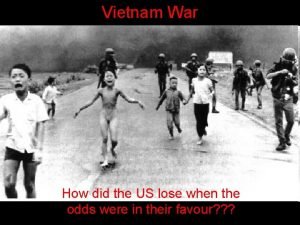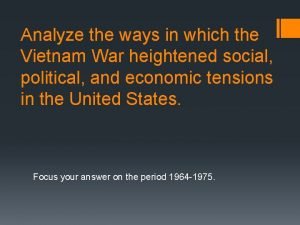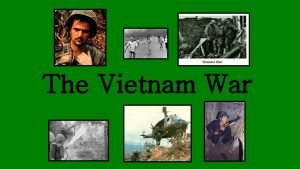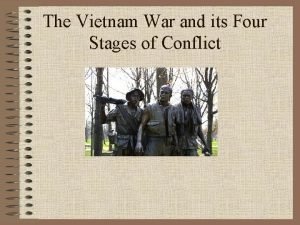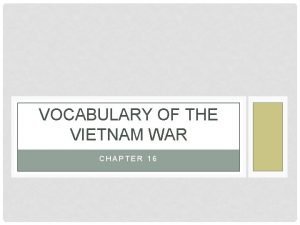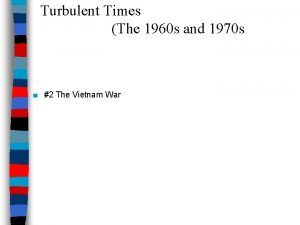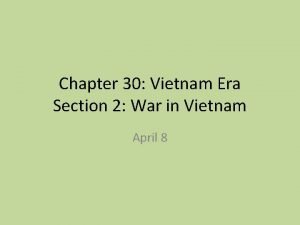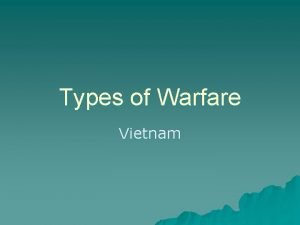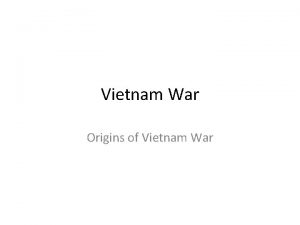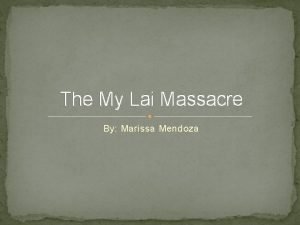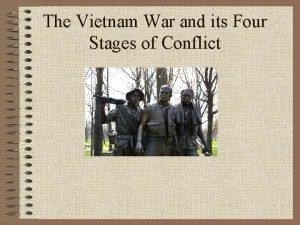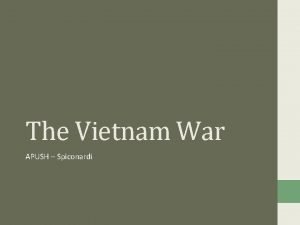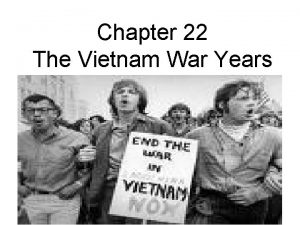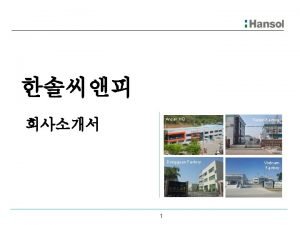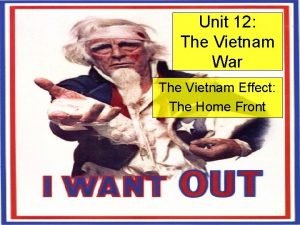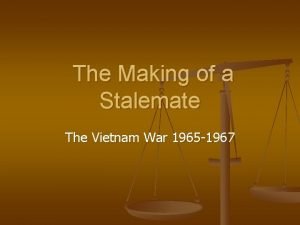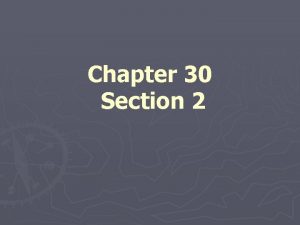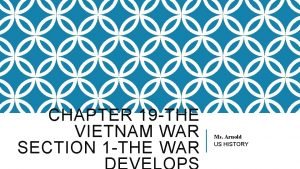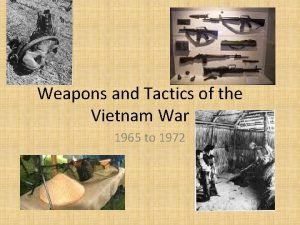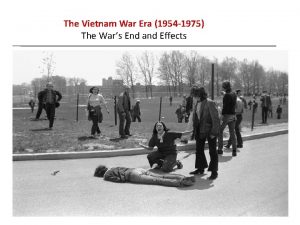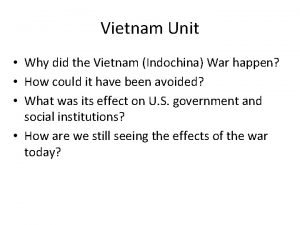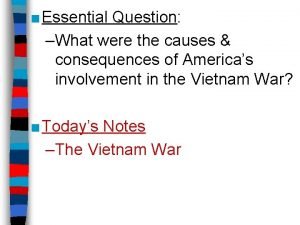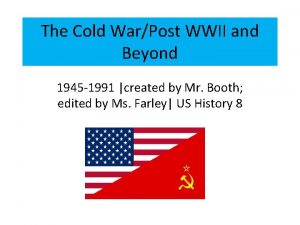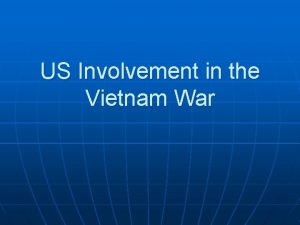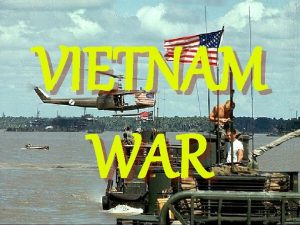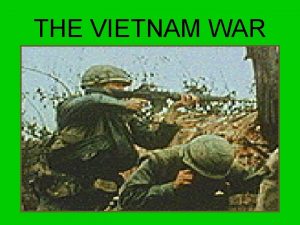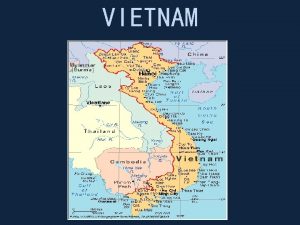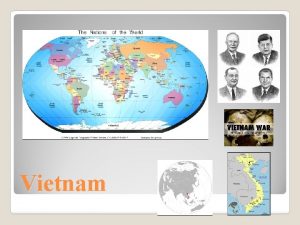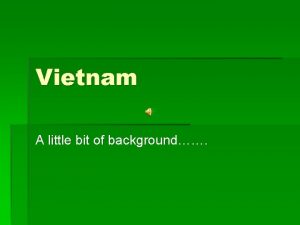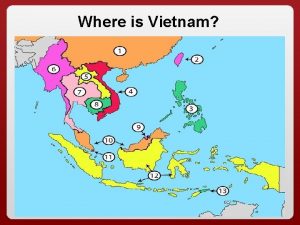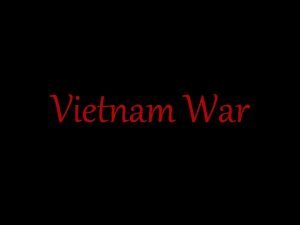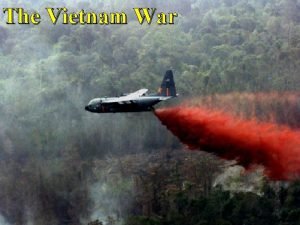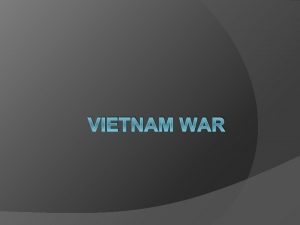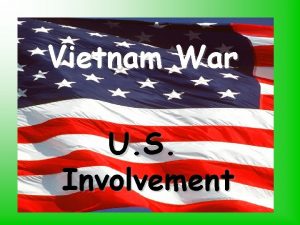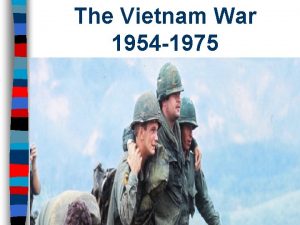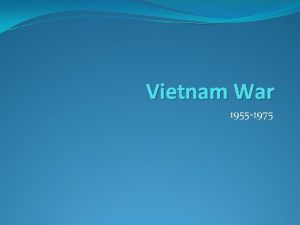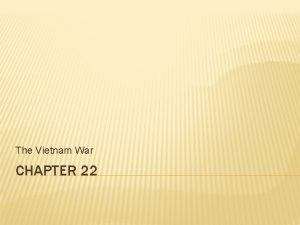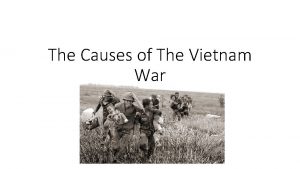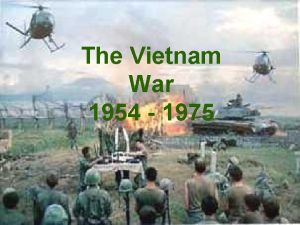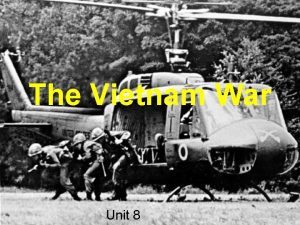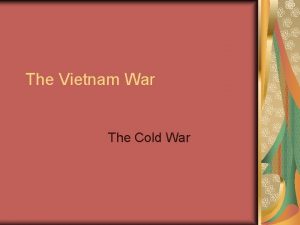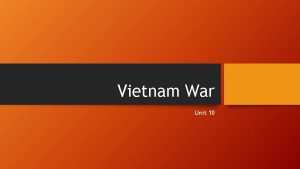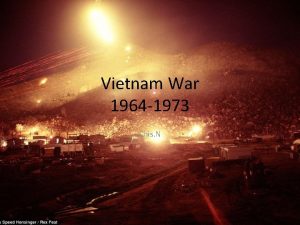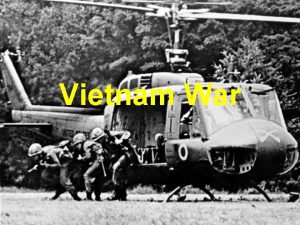Vietnam War The War in Vietnam Vietnam War






























- Slides: 30

Vietnam War / The War in Vietnam

Vietnam War - outline • Origins of the Vietnam War • • • The First Indochina war The French lose Vietnam Ho Chi Minh Geneva accords South Vietnam Buddhist revolt • American involvement in Vietnam • Military advisers • Who fought in the Vietnam War • • Proxy war South Vietnam USA and its Allies North Vietnam • Viet Mingh • Viet Cong • Laos • Third Indochina War • Cambodia

Vietnam War – outline continued • Escalation • Gulf of Tonkin Incident • Gulf of Tonkin Resolution • • • War of Attrition Ho Chi Minh Trail Tet Offensive Saigon My Lai Vietnam War in America • VW in the Media • Anti-war protests • Campus unrests • Vietnamization • Americans withdraw • War continues until 1975 • Third Indochina War • Legacy of the Vietnam War


Vietnam • Ancient history: Cambodia, Laos, and Vietnam have common culture & religion. All trade and fight with • Approximately 200 BC – 939: China is in fact controlled by Vietnam • 939: Vietnam a separate country • French take over Cambodia, Laos and Vietnam in 1880’s. French Indochina (by 1893). • In Vietnam three different French administration centers: in the North (Tonkin), Center (Annan) and South (Cochina) • A number of anti-colonialist movements, a significant Vietnamese elite educated in France and other Western countries • E. g. 1885 0 1889 Cần Vương insurgency, 1916 Cochina uprising, 1917 Thái Nguyên uprising • 1940 – France loses Vietnam to Japan after the defeat to Germany. March 1945 – the French removed by Japan from Vietnam. Japan rules through Bảo Đại • WW II sparks anti-collonialist guerillas. E. g Viet Minh – created in 1941 (Ho Chi Minh) • August 1945 – August Revolution – Viet Minh seizes control of Hanoi (North administration capital) • Ho Chi Minh’s power also recognized in the South (emperor of South Vietnam Bảo Đại abdicates) • Democratic Republic of Vietnam (DRV) created in September 1945 • The French return in 1946 to reclaim their colonies in Indochina


Ho Chi Minh • His father – a Confucian scholar and teacher, an imperial administrator • Given French-styled education • Worked on French ships and hence traveled extensively, including vistits to the USA and UK • Becomes politically active in France and turned to revolutionary Marxism • One of the leaders of communist vietnamese exiles in France and an important figure in Comintern • Stayed in the Soviet Union for a time, learned and taught at the Lenin Institute • In the 1940 s became a significant leader of the independence movements and de facto leader of Viet Minh, clandestinely supported by the OSS • In 1945 pens the Vietnamese Declaration of Independence

Declaration of Independence of Vietnam, September 2, 1945 All men are created equal. They are endowed by their Creator with certain inalienable rights, among them are Life, Liberty, and the pursuit of Happiness. " This immortal statement was made in the Declaration of Independence of the United States of America in 1776. In a broader sense, this means: All the peoples on the earth are equal from birth, all the peoples have a right to live, to be happy and free. The Declaration of the French Revolution made in 1791 on the Rights of Man and the Citizen also states: “All men are born free and with equal rights, and must always remain free and have equal rights. ” Those are undeniable truths. Nevertheless, for more than eighty years, the French imperialists, abusing the standard of Liberty, Equality, and Fraternity, have violated our Fatherland oppressed our fellow-citizens. They have acted contrary to the ideals of humanity and justice.

Vietnamese Declaration of Independence, cntd In the field of politics, they have deprived our people of every democratic liberty. They have enforced inhuman laws; they have set up three distinct political regimes in the North, the Center and the South of Vietnam in order to wreck our national unity and prevent our people from being united. They have built more prisons than schools. They have mercilessly slain our patriots; they have drowned our uprisings in rivers of blood. They have fettered public opinion; they have practiced obscurantism against our people. To weaken our race they have forced us to use opium and alcohol. In the field of economics, they have fleeced us to the backbone, impoverished our people, and devastated our land. They have robbed us of our rice fields, our mines, our forests, and our raw materials. They have monopolized the issuing of bank-notes and the export trade. They have invented numerous unjustifiable taxes and reduced our people, especially our peasantry, to a state of extreme poverty. They have hampered the prospering of our national bourgeoisie; they have mercilessly exploited our workers. In the autumn of 1940, when the Japanese Fascists violated Indochina’s territory to establish new bases in their fight against the Allies, the French imperialists went down on their bended knees and handed over our country to them.

Vietnamese Declaration of Independence, ctnd Thus, from that date, our people were subjected to the double yoke of the French and the Japanese. Their sufferings and miseries increased. The result was that from the end of last year to the beginning of this year, from Quang Tri province to the North of Vietnam, more than two million of our fellow-citizens died from starvation. On March 9, the French troops were disarmed by the Japanese. The French colonialists either fled or surrendered showing that not only were they incapable of “protecting” us, but that, in the span of five years, they had twice sold our country to the Japanese. On several occasions before March 9, the Vietminh League urged the French to ally themselves with it against the Japanese. Instead of agreeing to this proposal, the French colonialists so intensified their terrorist activities against the Vietminh members that before fleeing they massacred a great number of our political prisoners detained at Yen Bay and Caobang. Notwithstanding all this, our fellow-citizens have always manifested toward the French a tolerant and humane attitude. Even after the Japanese putsch of March 1945, the Vietminh League helped many Frenchmen to cross the frontier, rescued some of them from Japanese jails, and protected French lives and property. From the autumn of 1940, our country had in fact ceased to be a French colony and had become a Japanese possession. After the Japanese had surrendered to the Allies, our whole people rose to regain our national sovereignty and to found the Democratic Republic of Vietnam. The truth is that we have wrested our independence from the Japanese and not from the French.

Vietnamese Declaration of Independence, ctnd The French have fled, the Japanese have capitulated, Emperor Bao Dai has abdicated. Our people have broken the chains which for nearly a century have fettered them and have won independence for the Fatherland. Our people at the same time have overthrown the monarchic regime that has reigned supreme for dozens of centuries. In its place has been established the present Democratic Republic. For these reasons, we, members of the Provisional Government, representing the whole Vietnamese people, declare that from now on we break off all relations of a colonial character with France; we repeal all the international obligation that France has so far subscribed to on behalf of Vietnam and we abolish all the special rights the French have unlawfully acquired in our Fatherland. The whole Vietnamese people, animated by a common purpose, are determined to fight to the bitter end against any attempt by the French colonialists to reconquer their country. We are convinced that the Allied nations which at Tehran and San Francisco have acknowledged the principles of self-determination and equality of nations, will not refuse to acknowledge the independence of Vietnam. A people who have courageously opposed French domination for more than eight years, a people who have fought side by side with the Allies against the Fascists during these last years, such a people must be free and independent. For these reasons, we, members of the Provisional Government of the Democratic Republic of Vietnam, solemnly declare to the world that Vietnam has the right to be a free and independent country—and in fact is so already. The entire Vietnamese people are determined to mobilize all their physical and mental strength, to sacrifice their lives and property in order to safeguard their independence and liberty.

The First Indochina War (1946 -1954) • 1945 – Ho Chi Minh in the north, accepted by the Chinese, supported by the OSS (Americans), rejected by the British (controlling Saigon) • The British call in the French forces to take over Indochina again • 1946 – French Union created • Viet Minh frequently collaborates with the French to eliminate Nationalist opposition • 1946 the war begins • 1947 – efforts to unify Vietnam fail, Viet Minh grows in guerilla power • 1949 – State of Vietnam created, Bảo Đại made Chief of state, State of Vietnam recognized internationally in 1950, though perceived to be a puppet state. • la sale guerre (dirty war) • The war is hugely unpopular in France • Hence recruits from French Union colonies are used - Algeria, Morocco and even Vietnam and French Foreign Legion • Metropolitan recruits (white French) not used • May 1954 – Battle of Dien Bien Phu – decisive French defeat • Results: • Vietnam partitioned between North (controlled by the Viet Minh) and South (controlled by the State of Vietnam) • between 100, 000 and 150, 000 civilians murdered and assassinated during the war by Viet Minh • Geneva Conference • Departure of the French from Indochina • Vietnam, Laos and Cambodia gain independence


Geneva Conference (1954) • Geneva Accords (the terms referring to Vietnam) • a "provisional military demarcation line" running approximately along the 17 th Parallel • a 3 miles (4. 8 km) wide demilitarized zone on each side of the demarcation line • French Union forces to regroup to the south of the line and Viet Minh to the north • free movement of the population between the zone for three hundred days • neither zone to join any military alliance or seek military reinforcement • establishment of the International Control Commission, comprising Canada, Poland India as chair, to monitor the ceasefire • Vietnam divided • North – Democratic Republic of Vietnam ( DRV), Ho Chi Minh • South – Republic of Vietnam (RVN), Ngo Dinh Diem • Unification planned for 1956


American Involvement in Vietnam prior to the Vietnam War • The USA is first neutral towards the First Indochina War • Viet Minh were an important ally during WW II • USA openly opposes European colonisation • USA busy in Europe with the Iron Curtain Crisis, Greece, Turkey • Mutual Defense Assistance Act (1950– 1954) • US Navy assistance to the French (1951– 1954) • US Air Force assistance the French (1952– 1954) • CIA operations (1954) • Operation Passage to Freedom (1954) • Southeast Asia Treaty Organization (SEATO) created by the USA, France, Great Britain, New Zealand, Australia, the Philippines, Thailand Pakistanto give recognition to South Vietnam – South Vietnam is signed up as a member of SEATO • Ngo Dinh Diem as the president of the Republic of Vietnam in the South in 1955 • Diem – supported by the USA - refuses to organize elections • Second Indochina War (Vietnam War) begins in 1956 • Domino princilpe / Stopping the spread of Communism • John Foster Dulles • Dwight Eisenhower

Ngo Dinh Diem thanks Kennedy Since its birth, more than six years ago, the Republic of Vietnam has enjoyed the close friendship and cooperation of the United States of America. . . . For more than 2, 000 years my people have lived and built, fought and died in this land. We have not always been free. Indeed, much of our history and many of its proudest moments have risen from conquest by foreign powers and our struggle against great odds to regain or defend our precious independence. But it is not only our freedom which is at stake today, it is our national identity. For, if we lose this war, our people will be swallowed by the Communist bloc, all our proud heritage will be blotted out by the “Socialist society” and Vietnam will leave the pages of history. We will lose our national soul.

Ngo Dinh Diem’ rule • Often perceived as a US puppet, yet he’s a hugely controversial figure • Rule based – ostensibly – on Catholic and Confucian principles • Land reforms – ambitious yet ineffective • Very heavy repressions against the caoomunists (over 12. 000 commuists killed before 1959, over 40. 000 jailed, later the repressions extended to all and any kind of political opposition, including anti-communist movements • By 1959 formal communist and leftist organizations do not exist, South Vietnamese call for guerilla actions and seek suport from the North • 1960 National Liberation Front (NFL - Viet Cong) created with the DRV support and instructed to Begin guerilla operations • French agroville program - 1957 - Rural Community Development Program, 1962 – Strategic Hamlet Program • Ressetlements, often forced, huge corruption, total failure – one of the foundations of American problems in VIetnam • By 1963 several assassination attempts • November 1963 – Diem assassinated • Coup d’etat in Soth Vietnam


photo by Malcolm Browne, Wide World Photos, Inc. Thich Quang Duc commits self-immolation in Saigon on June 11, 1963.

Gulf of Tonkin incident / Gulf of Tonkin Resolution • On August 2, 1964 USS Maddox pursued by three North Vietnamese Navy torpedo boats • USS Maddox fires warning shots • Reports being shot at • USS Maddox returns fire • Defense Department does not react to this, as it seems routine at this point of the conflict • On August 4, 1964 the second attack on USS Maddox and USS Turner Joy is reported to Pentagon • the destroyers received radar, sonar, and radio signals that they believed signaled an attack • For 4 hours the ships fired on radar targets and maneuvered vigorously amid electronic and visual reports of enemies • Pentagon (R. Mc. Namara) urges President to take retaliatory action • We know today that the August 4 attack never took place • Congress responds with the Gulf of Tonkin Resolution • Go. TR is the Vietnam War • Massive escalation follows

Ho Chi Minh Trail • A network of roads and tunnels, not a single path or trail • The trail often snaked into Cambodia and Laos • Much of the material transported through the Ho Chi Minh trail was carried on foot, by bikes, using animals • Heavy bombing of the trail leads to the escalation of the war • A theater of numerous Spec Ops • Ho Chi Minh trail instrumental for Viet Cong operations in the South • NSA calls it in its official history of the Vietnam War one of the greatest achievements of the military engineering of the 20 th century

Operation Rolling Thunder • 2 March 1965 until 2 November 1968 • Bombing of North Vietnam • to boost the morale in the Republic of Vietnam • to persuade North Vietnam to cease its support for the communist insurgency in South Vietnam without actually taking any ground forces into communist North Vietnam • to destroy North Vietnam's transportation system, industrial base, and air defenses • to halt the flow of men and material into South Vietnam • Strategy of gradualism • Nearly 1000 US airplanes lost • Robert Mc. Namara replaced

Tet Offensive • January 30 1968 the offensive begins • A coordinated attack on all province capitols in the South and on other targets • A tectical victory for the US and South Vietnam • Major PR deafeat for the US


Nguyen Ngoc Loan executes an alleged Viet Cong guerilla Nguyễn Văn Lém February 1, 1968. This Associated Press photograph won a 1969 Pulitzer prize for the photographer Eddie Adams.

My. Lai Massacre • March 16, 1968 • My. Lai does not even exist… Pinkville • Between 304 and 504 unarmed civilians killed • Company C of the 1 st Battalion, 20 th Infantry Regiment, 11 th Brigade of the 23 rd (Americal) Infantry Division • Cpt. Ernest Medina • Lt. William Calley • PFC Michael Bernhardt • Hugh Thompson • Ronald L. Haeberle • Tom Glen • Colin Powell • Ronald L. Ridenhour – letter to 30 Congress members. Ignored by all but three • Congressman Mo Udalll, and Senators Barry Goldwater and Edward Brooke • Seymour Hersh, November 12, 1969 – the story breaks

Photo taken by United States Army photographer Ronald L. Haeberle on March 16, 1968 in the aftermath of the My Lai massacre

June 8, 1972. Kim Phuc Phan Thi, center, running down a road near Trang Bang, Vietnam, after a napalm bomb was dropped on the village of Trang Bang suspected by US Army forces of being a Viet Cong stronghold. Photographer: Huynh Cong Ut (also known as Nick Ut). The image won the Pulitzer Prize for spot news.

Pentagon Papers
 Description
Description Presidential and radical reconstruction venn diagram
Presidential and radical reconstruction venn diagram Analyze the ways in which the vietnam war heightened social
Analyze the ways in which the vietnam war heightened social Vietnam tunnels
Vietnam tunnels Stages of the vietnam war
Stages of the vietnam war Vietnam war vocabulary
Vietnam war vocabulary Vietnam war 1960
Vietnam war 1960 Era section 2
Era section 2 Vietnam war traps
Vietnam war traps The vietnam war
The vietnam war Marissa lai
Marissa lai Vietnam war stages
Vietnam war stages Vietnam war apush
Vietnam war apush The vietnam war years chapter 22
The vietnam war years chapter 22 Reason for vietnam war
Reason for vietnam war Vietnam war
Vietnam war Pro vietnam war slogans
Pro vietnam war slogans Did the vietnam war end in a stalemate
Did the vietnam war end in a stalemate Chapter 30
Chapter 30 Chapter 19 the vietnam war
Chapter 19 the vietnam war Us weapons vietnam war
Us weapons vietnam war Effects of the vietnam war
Effects of the vietnam war Operation rolling thunder cold war
Operation rolling thunder cold war What were the causes and effects of the vietnam war
What were the causes and effects of the vietnam war Civil war digging deeper webquest answers
Civil war digging deeper webquest answers Vietnam
Vietnam Chúa yêu trần thế
Chúa yêu trần thế Tỉ lệ cơ thể trẻ em
Tỉ lệ cơ thể trẻ em Hổ đẻ mỗi lứa mấy con
Hổ đẻ mỗi lứa mấy con đại từ thay thế
đại từ thay thế Vẽ hình chiếu vuông góc của vật thể sau
Vẽ hình chiếu vuông góc của vật thể sau
